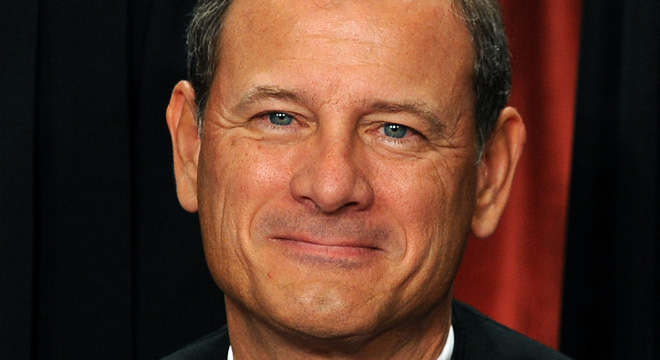In a little-noticed exchange Monday, conservative Supreme Court Chief Justice John Roberts may have tipped his hand that he’s entertaining the possibility that the health care law’s individual mandate can be upheld on a constitutional basis that’s different from the one supporters and opponents have made central to their arguments.
For over a year now, observers and experts have assumed that the court’s final decision will hinge on the extent of Congress’ power to regulate interstate commerce. But the justices could also upend that conventional wisdom, and in a worrying sign for the plaintiffs on Monday, Roberts unexpectedly highlighted one way they could do that.
In an exchange with a plaintiffs attorney, Roberts suggested he’s skeptical that the mandate and its penalties can be treated separately and may have opened the door to finding that Congress’ power to impose the mandate springs from its broad taxing power.
“The idea that the mandate is something separate from whether you want to call it a penalty or tax just doesn’t seem to make much sense,” Roberts said, over strong objections from attorney Gregory Katsas. “It’s a command. A mandate is a command. If there is nothing behind the command, it’s sort of, well what happens if you don’t file the mandate? And the answer is nothing. It seems very artificial to separate the punishment from the crime. … Why would you have a requirement that is completely toothless? You know, buy insurance or else. Or else what? Or else nothing.”
That wasn’t what the challengers wanted to hear. A key feature of their argument is that the individual mandate is distinct from the fine the government will assess on people who fail to purchase insurance. They say the case isn’t about Congress’ power to tax or penalize people but rather about its power to force people to take actions they may not want to take. Roberts dismissed this distinction.
The question now is how far-reaching the implications of that dismissal are. It’s possible that Roberts was linking the mandate and its enforcement mechanism for the purpose of answering a much narrower question — that it wasn’t a tip-of-the-hand at all. But if the two measures are linked, then the court could easily conclude they both stem from the same power, and give them the green light.
“Struck me too,” said Timothy Jost, a legal scholar and supporter of the health care law, who has followed these arguments very closely. “This is a big problem for the states’ Medicaid argument and might even support the federal government’s argument that the mandate is an exercise of the taxing power.”
The states want to avoid that at all costs — the taxing power is far too broad. In a written brief, attorneys for the state respondents noted, “The federal government’s last ditch effort to abandon its earlier rhetoric and defend the mandate as a tax fails for the simple reason that, regardless of its enforcement mechanism, the mandate itself is not a tax.”
Roberts suggested Monday that distinguishing between the two might not be so easy.
Randy Barnett, a constitutional scholar and one of the architects of the legal challenge, isn’t concerned just yet. He thinks Roberts’ critique was limited to the narrower subject of Monday’s arguments over whether the court has the jurisdiction to rule on the merits of the case yet, given that nobody will be assessed a fee for violating the mandate until 2015.
“The only thing I think Chief Justice Roberts was expressing resistance to was our argument that the mandate was separate from the penalty for purposes of the [Anti-Injunction Act],” Barnett said in an email. “That is only one of the bases on which the AIA does not foreclose consideration on the merits. I don’t think he was signaling anything at all about the constitutionality of the mandate penalty, the subject of tomorrow’s argument. If he was, however, I expect to get a much better sense of that tomorrow so we won’t have to wait long to find out.”






